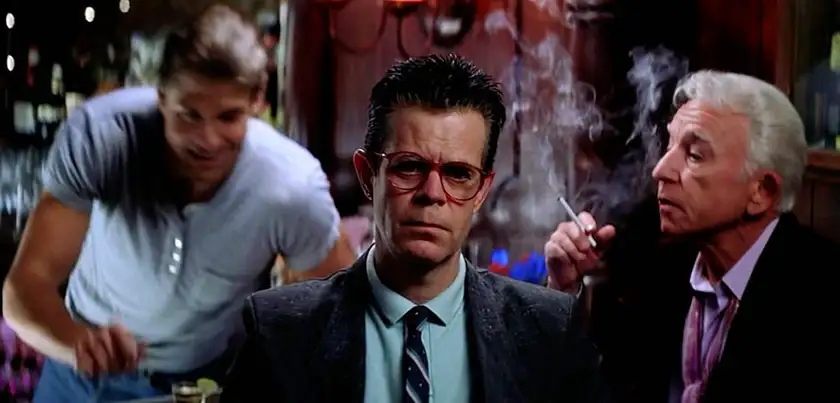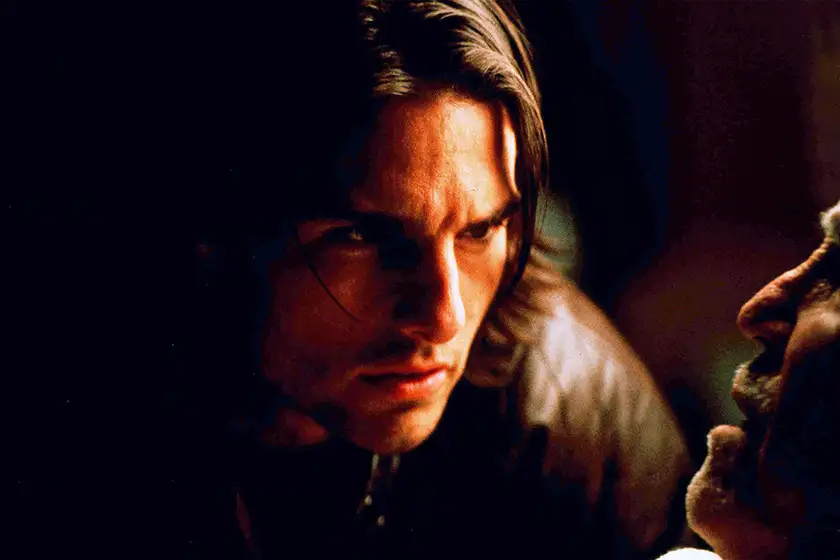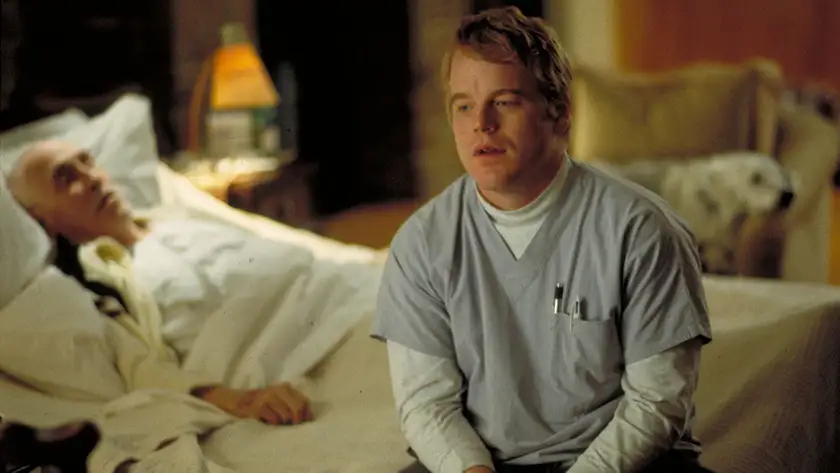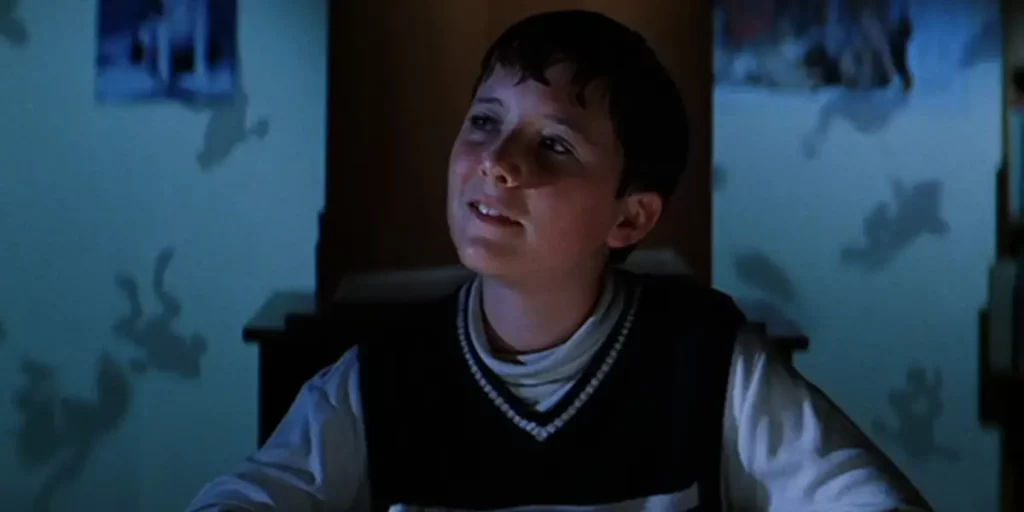As Paul Thomas Anderson’s Magnolia turns 25, we explore how it continues to offer hope to its characters and its audience.
*This article contains spoilers for the entirety of Magnolia.*
“The past is never dead. It’s not even past”
When William Faulkner wrote “Requiem For a Nun,” he couldn’t have imagined how much the lines above would stick with the general populace. We are all products of the past, but we are also slaves to it, never able to escape. Paul Thomas Anderson’s magnum opus Magnolia is an all-encompassing exploration of our relationship to the past, as profound as any as can be found in all of art. Some of its characters are desperate to forget the past, others wish to reconcile themselves to it, and others want to change it. However, for all the desperation on display, Anderson finds radical hope in connection.
Often unbeknownst to the characters of Magnolia themselves, they are connected through family, business, and fate. It’s another of those classic L.A. ensemble films, filled with characters on apparently divergent paths that can’t help but overlap. One can point to Heat or L.A. Confidential as examples, but the most obvious predecessors are two Robert Altman opuses, Nashville and Short Cuts. The latter is a particularly big influence on Magnolia, with its multiple characters navigating love, death and natural disasters in the contemporary City of Angels. Anderson is an Angelino, having grown up in the San Fernando Valley area of south-east Los Angeles, and many of his films are set and/or shot there. The area also provided the bedrock of Anderson’s thematic preoccupations, and these themes are explored in a particularly personal and heartfelt way in this, his third feature.
The various plots in Magnolia are tricky to map out, but they emanate from two older characters who anchor the action. Jimmy Gator (Philip Baker Hall) is the beloved host of a TV quiz show, What Do Kids Know? The show sees bookish young people go up against grown adults to perform displays of knowledge that wouldn’t be out of place on University Challenge. The action of Magnolia centres on a live broadcast of the show, as it plays in the background of much of the rest of the plots.
One of these plots is that of Earl Partridge (Jason Robards, in his final film performance), who lies dying at home while undergoing palliative care. These two men are connected by the programme (In one brief shot, we learn that Earl’s production company runs the show) and by illness. Jimmy is also dying of cancer, but he’s hiding this and other secrets from the people around him. From these two men, we follow a dozen more characters closely, all tied together by unseen bonds, and all are deep in some kind of existential despair.

Magnolia is a film replete with ambition, as evidenced in its many characters, thematic concerns, and stylistic flourishes. When the film was released, the Altman-esque structure of multiple narratives seemed to be Anderson’s preoccupation, following on from the similarly ambitious and densely populated Boogie Nights. However, Anderson confounded resulting expectations by following Magnolia with a 90-minute Adam Sandler rom-com. While he’s made many a deep and engrossing exploration of human failings since, he’s never tried something as operatic, openly emotional or hopeful as Magnolia before or since. Hope is baked into the very fabric of the film. There are multiple characters to follow, but each one has a mirror in someone else. Each mirrored storyline offers an alternative approach to a given theme or narrative development. There is more than one way for the story to go, and therein lies hope.
There are two old men dying of cancer, two people broken by their parents’ exploitation of their childhood stardom, two grown-up children reconciling themselves to being abused. Anderson knows that coinciding storylines is potentially a gambit too far, so he begins the film with three short vignettes, separate from the main action, that explain how coincidence can dictate our lives. Narrated by actor and magician Ricky Jay, these vignettes allow us to suspend disbelief for the three hours that follow. If a scuba diver can manifest in a treetop, and a man can be implicated as an accomplice in his own murder, the coincidences that follow are entirely possible. As Jay notes, “These strange things happen all the time.”
Repeating the past in Magnolia
Magnolia can be interpreted as a series of conversations, between characters and between timelines. The mirroring plotlines are often a result of shared experiences from the past, rather than direct contemporary links. The mirrors inform and direct each other in surprising ways, with the past informing the present, and the present recontextualising the past. It is worth nothing that Anderson wrote Magnolia shortly after the death of his own father. Ernie Anderson was a TV and radio personality, best known for his voiceover work on ABC. The elder Anderson was a great influence on the character of Jimmy Gator. Anderson enjoyed a close bond with his father, but he uses the Jimmy storyline to probe at an unspoken truth in the entertainment industry, and life in general; the actions of one generation can traumatize the next. An early scene sees Jimmy try to reconcile with his estranged daughter Claudia (Melora Walters). She explicitly rejects his attempts, and we subsequently learn that this is due to abuse he perpetrated on her when he was a child, and her resulting descent into drug abuse and isolation.
Jimmy’s success masks his guilt as a child abuser. However, he also partakes in other forms of child abuse in an indirect way through What Do Kids Know?. The very premise of the show represents the theme of the cyclical nature of abuse. Stanley (Jeremy Blackman), one of the child contestants on the show, is being exploited by his father (Michael Bowen) for the prize money. As a warning of what this could do to Stanley, we also meet Quiz Kid Donnie Smith (William H. Macy), a one-time What Do Kids Know? winner, now fully grown and living a humdrum life after his parents embezzled his winnings.
In the overlapping storylines of Stanley and Donnie, we see that the effects of abuse are multigenerational, and they linger. Donnie was not only used by his parents, but now only knows how to allow himself to be used. Early in Magnolia, Donnie gets fired from his job as an electronics salesman due to tardiness and incompetence. He allowed his employer (Alfred Molina) to use his notoriety as the ‘Quiz Kid’ for advertising, but this goes unappreciated. As we watch the lovelorn Donnie drunkenly confess his love to a hunky bartender, we must hope that Stanley’s thwarted childhood needn’t turn out such a pathetic result.
Like Jimmy, Earl too begins to feel regret for the pain he caused the son he abandoned, when the boy was a teenager. However, we see that the boy has grown up to become Frank T.J. Mackey, a successful hype man and progenitor of the game-playing Alpha Male type that Andrew Tate would epitomize in the digital age. In the role of Frank, Tom Cruise uses this foul-mouthed would-be lothario to exorcise the demons of shooting Eyes Wide Shut for a year to portray a complexity many would have thought beyond his talents. His performance as Mackey, and his flip from bravura ladies’ man to vulnerable son, is magnificent, and it remains a high point in Cruise’s career. Frank is the flipside of Claudia, burying his trauma in a warped version of success. Neither one is a role model for coping, but these stories offer two different and recognisable responses to deep-seeded pain.

Earl is sincere in seeking Frank’s forgiveness, but Jimmy is still in denial of what he did to Claudia. It’s only when his wife Rose (Melinda Dillon) pushes him towards a confession that we realize Jimmy can’t seek forgiveness because he can’t admit his guilt. Magnolia is about searching for forgiveness, and the ability to forgive. Claudia cannot forgive Jimmy, and Frank might forgive Earl, but different viewers will empathize with at least one of them. At one point, a character muses, “What can we forgive?” This question gets to the heart of what Magnolia is about; forgiveness offers hope, and we must question how much pain has to heal before letting it go in exchange for a hopeful future.
The overlapping storylines in Magnolia are a sobering reminder that we human beings are doomed to repeat ourselves, but even then, Anderson remains hopeful. Stanley is still young enough to escape if his circumstances can change, while Donnie finds hope in rejection. Once the object of his affection turns him down, Donnie finds energy in taking revenge in his ex-employer by robbing him. Maybe not the right choice, but it does see Donnie reclaiming some agency through action. The characters in Magnolia are constantly threatening to undermine themselves by their actions but Anderson, the benevolent god overseeing proceedings, throws in curveballs of all shapes and sizes.
Narratively, two characters act as conduits to hope. Police officer Jim (John C. Reilly) is looking for love and finds himself smitten when a routine call brings him into Claudia’s orbit. She’s had lovers and hookups, but Jim’s gaze might be the most loving look she’s received in years. Meanwhile, Earl’s care nurse Phil (Philip Seymour Hoffman) does his utmost help reunite Earl with Frank, even going behind the back of Earl’s wife, the fiery but regretful Linda (Julianne Moore). Phil acknowledges his role within the narrative as a giver of hope. When trying to track down Frank via his company’s sales department, he tells the confused operative on the other end of the line, “This is the scene in the movie where you help me out.”
The miracle of hope in Magnolia
Phil is ultimately successful in tracking down Frank, but before the reunion of father and son can take place, we get one of Magnolia’s coups de grace. Magnolia’s emotionality is displayed not only by the characters, but in Anderson’s long takes, sweeping camera, and use of music. Opera and ‘90s pop feature on the soundtrack, but Magnolia is synonymous with one artist. The songs of Aimee Mann inspired Anderson while writing, and snippets of her lyrics appear in the dialogue (“Now that I’ve met you, would you object to never seeing each other again?”).
Yet, nothing can prepare you for your first viewing of the ‘Wise Up’ sequence. Every character, having reached a nadir, does that most familiar thing of finding solace in a reassuring favourite song. Anderson cuts to each character singing a line from Mann’s beautifully wise ballad, releasing the words like prayers in hope that Anderson/God/fate might hear their attempts at common sense, and give them hope and clarity. It’s a bravura piece of filmmaking, with Anderson running on faith that the audience will go with it. We’ve all hummed a tune to try to keep back the tears, and we know this pain.

Anderson is right to show faith in his filmmaking, not least because Magnolia is a film about faith of all kinds. Jim is the only expressly religious character in the film, but every other character is defined by a crisis of belief, either because they lack belief in themselves, or they cannot get over the hand they have been dealt by life. Magnolia is populated by corrupt and cruel father figures, fallen godheads who cannot inspire faith anymore. Frank’s extreme self-belief is born of his father’s abandonment, as is Claudia’s hopeless resignation. Yet, even amidst all these people’s despair, there is room for hope. The ‘Wise Up’ sequence is a declaration of hope for the characters, and that hope is repaid in Magnolia’s final act.
Magnolia reaches a crescendo with its second coup de grace, which sees everyone united in shock as a shower of frogs rains from the sky. This isn’t unheard of in nature (Stories are told of such showers after a tornado passes over a lake or pond, and deposits its resulting amphibian payload), but it strikes the viewer as a miraculous event. Short Cuts ends with an earthquake that screams deus ex machina, but Magnolia’s shower of frogs is too unique to dismiss so easily.
Anderson hints at the Biblical connotations of the frogs by scattering nods throughout the film to Exodus 8:2 (“And if thou refuse to let them go, I shall smite all thy borders with frogs”). This miracle delivers so much of the catharsis the characters need. Claudia’s mother Rose runs to her to comfort her from the shower. The noise of the frogs falling wakes the comatose Earl to see Frank one last time. They even interrupt the guilt-ridden Jimmy while attempting to take his own life, but possibly cause his death regardless. Stanley sums up the event, and Magnolia, as he watches the event through a window and declares, “This is something that happens.” Hope and miracles do happen.
Magnolia is an extraordinary film about ordinary lives. The inventiveness of its plotting and filmmaking comes second to the display of the very human desires for forgiveness and hope. The characters hope for extraordinary acts of compassion, and the resulting events bind them together in moments of kindness. Anderson made the film in his own search for catharsis. With so many depictions of hope and faith across its uniformly-superb ensemble, Magnolia has a vision of hope to offer every viewer, even after all this time. “And the book says, ‘We may be through with the past, but the past ain’t through with us.’”
Magnolia is now available to watch on digital and on demand. Read our list of Paul Thomas Anderson’s movies ranked from worst to best!

